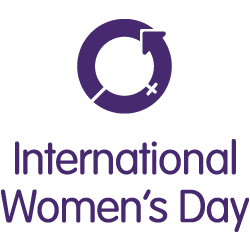This week I have attended two events celebrating International Women’s Day and on both occasions I would have liked to have seen more men. Though I would describe myself as a feminist, I do not want to ascribe all of women’s challenges to an evil patriarchy, but rather to inherited and socially engrained standards which afflict both men and women. And these need to change for both.
In this respect I also want to celebrate how far we have come, even though there is far to go. When I entered the workplace, it would have been inappropriate to wear trousers (I was told off) and certainly inappropriate to allow one’s children to be visible. Woe betide the mother who took time off for a sick child or the nativity play. That would confirm the view that she was not serious. None of that is now true. Both mothers and fathers can reasonably say they will be leaving early to attend a school function, and more and more fathers do one or other end of the school run.
But of course there are parts of the world where there is much more basic progress to be made, most especially in girls’ education. A world in which every woman is educated is a world where she can stand up for herself, demand proper treatment for her daughters and achieve visibility outside the home. Last autumn I climbed Kilimanjaro to raise money for the Railway Children charity, and afterwards our team went to visit some of the projects that our money supported. One family of five, with children from fifteen to two years, lived in one room about 4 metres square. Survival was a higher priority than equality of opportunity, although we were supporting the education of all of the children, both girls and boys.
Yet, visiting back office centres in India, I’ve found young women with more confidence and willingness to be the first to ask a question than I find at events in the UK. To stand up and be counted is a necessity. That is not about behaving like a Victorian maiden who must be protected from anything that might upset her. Demanding ‘safe spaces’ and freedom from affront feels to me like being unable to engage in debate with what is the other half of humanity, with whom we have more in common than otherwise. We should celebrate men as well as women who have taken forward the banner of equal rights and opportunities.
It is of course hard to engage in thoughtful debate and sometimes easier to resort to strident accusations and indeed violence. Which brings me to the question of whether I am a suffragist or a suffragette. At both the events this week, speakers focused on the centenary of votes for (some) women in the UK this year. At the first event, at which I was a speaker, the conversation focused on how to create ambition, and how to find mentors to allow one to realise it. At the second, there was a fascinating lecture by Carol Harris on the background, both domestic and international, to the struggle for Votes for Women. Much of the general knowledge about this struggle concentrates on the suffragettes, led by the Pankhursts, their focus on direct action – Deeds not Words – and the terrible treatment meted out to them by the government. Much less attention is given to the suffragists, whose approach was peaceful, even when their marches were attacked, and who worked to gain allies which would enable parliamentary change to happen.
Which were the more effective? Members of the WSPU had their health broken by violence and force feeding, and achieved massive visibility for their cause. The NUWSS, led by Millicent Fawcett, certainly took at more gentle line, but in the process gained a less visible but perhaps more effective impact. It’s a debate that perhaps we should pursue now to avoid labelling all men as bastard supporters of the patriarchy. And I’m not totally sure where I stand. I know that a younger me could have believed that only violence would end exploitation. But even a fairly young me realised that this could end badly. A society ruled by people who believe violence is a solution to disagreements is not a great place to live unless you toe the line or are part of the leadership. Participation in revolutionary politics taught me that valuable lesson.
Of course, supporting careful debate, persuasion and evolution not revolution does not prevent me being passionate about equal opportunity, girls’ education here and abroad and uncovering and managing unconscious bias. I will fight to reduce gender pay gaps, to support better jobs and better families, to ensure that bias does not undermine promotion opportunities, that maternity should not cut salary growth.
At the same time, I will also fight to respect difference and the right to make choices. I might feel that your choice to stay at home with your children is not the best use of your skills, but I defend your right to do that. I might think that you could make more difference in the world by working for a large business, but I defend your right to start your own business which can be small but where you won’t have to face the bias. Indeed I have to defend that position as it’s the one I took myself!
International Women’s Day has been this year particularly thought provoking. I shall have to sit down and think about my own next steps to uncover bias, both my own and others. And I shall try to deal with violence peacefully.
Bridget Rosewell
